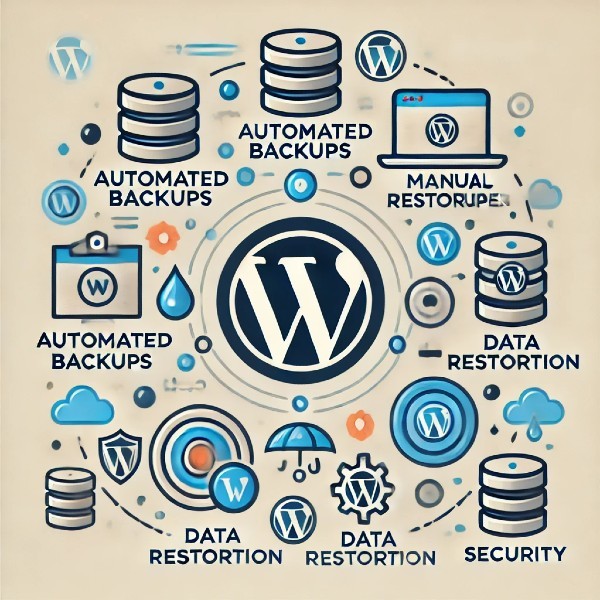Introduction
In the realm of WordPress hosting, the ability to backup and restore your site is paramount to ensuring its security and continuity. Regular backups protect your site from data loss due to hacking, server failures, or accidental deletions. This comprehensive guide will delve into the importance of good customer support, the necessity of regular backups, automated and manual backup options, how to restore your WordPress site, the best backup plugins, and choosing a hosting provider with robust backup services.
Importance of Good Customer Support in Web Hosting
Good customer support is essential in web hosting because it ensures that users receive timely assistance with any technical issues, including those related to backups and site restoration. Reliable support minimizes downtime, enhances user experience, and provides peace of mind knowing that help is available when needed. Effective customer support can address problems such as site outages, slow performance, and security concerns, helping maintain the integrity and functionality of your website. Hosting providers that offer 24/7 support through various channels like live chat, phone, and email are often preferred for their ability to address issues promptly and efficiently.
Importance of Regular Backups for WordPress Hosting
Regular backups are crucial for WordPress sites because they provide a safety net against data loss. Backups allow you to restore your site to a previous state in case of hacking, server crashes, or user errors. Without regular backups, you risk losing valuable content, customer information, and site functionality. Implementing a consistent backup schedule ensures that you always have a recent copy of your site’s data, which can be quickly restored in case of an emergency.
Detailed Insights on Regular Backups
For example, a popular blog might experience a sudden server failure, causing a complete loss of content and user data. With regular backups, the site owner can quickly restore the blog to its most recent state, minimizing disruption and data loss. Another instance is an e-commerce site that falls victim to a cyber-attack. Having regular backups allows the site owner to restore the site and recover lost orders and customer information, maintaining business continuity.
Automated Backup Solutions
Automated backup solutions are a convenient and reliable way to ensure that your WordPress site is regularly backed up without requiring manual intervention. Many hosting providers offer automated backup services as part of their hosting plans, providing daily or weekly backups. Additionally, there are numerous plugins available that can automate the backup process, allowing you to schedule backups and store them in various locations, such as cloud storage or external servers.
Detailed Insights on Automated Backups
For instance, WP Engine includes automated daily backups in their hosting plans, ensuring that users always have a recent backup available. These backups are stored securely and can be easily restored with a few clicks. Another example is the UpdraftPlus plugin, which offers automated backup scheduling and supports multiple storage options, including Google Drive, Dropbox, and Amazon S3. By using automated backup solutions, you can ensure that your site’s data is consistently protected without manual effort.
Manual Backup Options
While automated backups are convenient, manual backup options provide additional control and flexibility. Manual backups involve creating a copy of your site’s files and database manually and storing them in a secure location. This process can be done using FTP clients to download site files and database management tools to export the database. Manual backups are useful for creating additional backups before making significant site changes or for storing backups in multiple locations.
Detailed Insights on Manual Backups
For example, using an FTP client like FileZilla, you can manually download all your site’s files to your local computer. To backup your database, you can use tools like phpMyAdmin to export the database as an SQL file. These manual backups provide an extra layer of security, ensuring that you have control over your backup process. By combining manual and automated backups, you can create a robust backup strategy for your WordPress site.
How to Restore Your WordPress Site
Restoring your WordPress site involves using your backup files to revert your site to a previous state. The restoration process can vary depending on whether you are using automated or manual backups. For automated backups, many hosting providers and plugins offer one-click restore options, making the process straightforward. For manual backups, you will need to upload your site’s files via FTP and import the database using database management tools.
Detailed Insights on Site Restoration
For example, with WP Engine’s automated backup service, you can restore your site with a single click from the user dashboard. This quick and efficient process minimizes downtime and ensures that your site is back online as soon as possible. Another example is using the UpdraftPlus plugin, which allows you to restore your site from cloud storage with a few clicks. By understanding the restoration process, you can quickly recover your site from any data loss or corruption.
Best Backup Plugins for WordPress
Several backup plugins are available for WordPress, each offering unique features and benefits. Some of the best backup plugins include UpdraftPlus, BackupBuddy, and Duplicator. UpdraftPlus is known for its comprehensive features, including automated backups, multiple storage options, and easy restoration. BackupBuddy offers scheduled backups, remote storage, and site migration tools. Duplicator is popular for creating site clones and backups, making it easy to move or restore your site.
Detailed Insights on Backup Plugins
For instance, UpdraftPlus allows you to schedule automated backups and store them in various locations such as Google Drive, Dropbox, and Amazon S3. Its user-friendly interface makes it easy to manage and restore backups. BackupBuddy offers similar features, with the addition of site migration tools that simplify moving your site to a new host. Duplicator excels in creating complete site clones, which are useful for site migrations and creating backup archives. By choosing the right backup plugin, you can ensure that your WordPress site’s data is securely backed up and easily restorable.
Choosing a Hosting Provider with Robust Backup Services
Selecting a hosting provider that offers robust backup services is essential for ensuring the security and continuity of your WordPress site. Look for providers that include automated daily backups, secure storage, and easy restoration options. Additionally, consider providers that offer additional backup features such as off-site storage, backup redundancy, and detailed backup management tools. Reliable customer support is also crucial for addressing any backup-related issues.
Detailed Insights on Hosting Providers
For example, SiteGround offers automated daily backups with 30-day retention, providing users with a comprehensive backup history. Their platform includes easy restoration tools and secure off-site storage, ensuring that backups are safe and easily accessible. Another example is Kinsta, which provides automated daily backups, manual backup options, and a user-friendly dashboard for managing and restoring backups. Kinsta’s use of the Google Cloud Platform ensures high security and reliability for backup storage. By choosing a hosting provider with robust backup services, you can protect your site’s data and ensure quick recovery in case of any issues.
Conclusion
Regular backups and reliable restoration processes are crucial for maintaining the security and continuity of your WordPress site. By understanding the importance of good customer support, implementing automated and manual backup solutions, and choosing the right backup plugins and hosting providers, you can ensure that your site’s data is always protected. Having a solid backup strategy in place provides peace of mind and allows you to focus on growing and managing your website effectively.
References
Kinsta WordPress Hosting: Renowned for its managed WordPress hosting solutions, Kinsta offers a robust platform optimized for performance, scalability, and security. Powered by Google Cloud Platform, Kinsta ensures fast load times and high availability, making it a favorite among developers and businesses alike. The user-friendly dashboard, 24/7 support, and automatic backups enhance the hosting experience, making it seamless and efficient.
SiteGround WordPress Hosting: SiteGround is celebrated for its top-notch WordPress hosting services that combine speed, reliability, and security. With features like automated updates, daily backups, and a custom caching system, SiteGround provides an optimal environment for WordPress websites. Their excellent customer support and a variety of hosting plans cater to beginners and advanced users.
Bluehost WordPress Hosting: As one of the officially recommended hosting providers by WordPress.org, Bluehost is known for its affordable and reliable WordPress hosting plans. They offer a range of features, including a one-click WordPress installation, free domain for the first year, and 24/7 support, making it an ideal choice for both new and experienced users. Bluehost’s scalable solutions and extensive resources ensure that websites run smoothly and efficiently.

The Versatility of WordPress Hosting: A Perfect Fit for Various Professions






